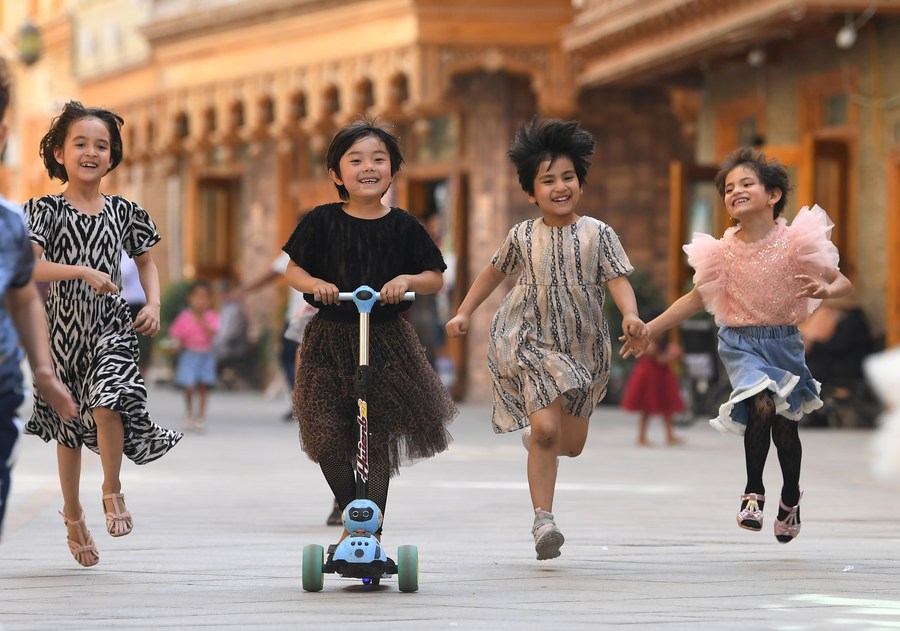
Children have fun in "Dove Lane" in the old town Tuancheng of Hotan City, northwest China's Xinjiang Uygur autonomous region, May 27, 2020. [Photo/Xinhua]
Recently, a series of short videos appeared on social media platforms showing Uygur people in southern Xinjiang in their daily lives, living happily and full of purpose. People featured in those videos are all graduates from vocational education and training centers in Xinjiang, which have been baselessly attacked by U.S. politicians.
The normal yet fulfilled life stories show that Xinjiang's anti-terrorism efforts are working. This in itself is the best refutation of the U.S. allegations.
Ezitmer, a lingerie shop owner, is one of the graduates. Every early morning, he goes out to buy supplies for the stock, and puts them on the shelf together with his wife after coming back to his store. Since he improved his Mandarin skills in one of the centers, he can now communicate easily with Han people. He has made friends with many Han people, and his business is thriving. He operates three lingerie stores and is still aiming for bigger goals.
The experience of Ezitmer living a fulfilled life is just one example of the lives of the Uygur people in southern Xinjiang. Yet, the U.S. still signed the Uyghur Human Rights Policy Act of 2020, which maligns the anti-terrorism and anti-extremism measures taken by the Chinese government and the human rights situation in the region. It severely interference in China's internal affairs, and violates both international laws and basic norms governing international relations.
The act alleged that more than 1 million Uygurs have been detained in the centers where religious freedom is violated and forced labor is imposed. Such ridiculous accusations conjured up from pure imagination fly in the face of reality and reason.
People who used to suffer terrorism and religious extremism in Xinjiang are best qualified to judge whether or not the centers are good.
Over the past three years, the trainees in the centers all started new lives after graduation. Some of them became photographers, opened nurseries, or even became auxiliary police officers. The centers helped trainees not only change their living conditions, but also their negative thoughts.
Asigul used to be crippled by her self-consciousness. She kept to herself and had no job. After graduating from one of the centers, she became more self-confident and now works as a clothing model.
Asigul also changed her mind about marriage with the help of the training center. In the past, she thought arranged marriage was the only option, but now she realizes that she can pursue her own love.
Asigul's story is not an exception. Many Uygurs who left the centers have become more open-minded and are keeping pace with the times in their thinking about life and work.
These are the real lives of trainees from the centers. Their lives are the best arguments against the U.S. labeling the facilities as "re-education camps" and "detention centers."
Xinjiang established vocational education and training centers in response to regional terrorism and extremism. The U.S. government, however, embraces double standards of ignoring the truth and slandering the efforts of Xinjiang to safeguard national security and protect the people living there.
There have been no terrorist attacks in Xinjiang for more than four consecutive years. People there are living peaceful and prosperous lives and enjoying the fruits of public security and ethnic solidarity.







